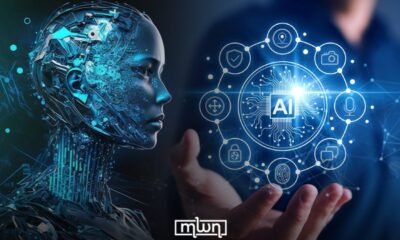Ethics & Policy
From Textbooks to Tech: How Indian Schools are Embracing AI in Education

From Textbooks to Tech: How Indian Schools are Embracing AI in Education
Photo : iStock
Artificial Intelligence (AI) and Machine Learning (ML) are no longer distant technological concepts. These are reshaping the way we live, work, and even learn. Recognising the potential, the Union Education Minister Dharmendra Pradhan recently said that it is important to bring these new tools into our classrooms, so that students can be ready for the future.
In 2022, UNESCO, too, had launched a report on how AI could change the Indian classrooms. Titled ‘State of the Education Report (SOER) for India: Artificial Intelligence in Education – Here, There and Everywhere’, the report stated that to responsibly integrate Artificial Intelligence in education, it is essential to prioritise ethics, establish a comprehensive regulatory framework, and foster strong public-private partnerships.
In response to this call, schools across the country are stepping up.
“Introducing AI and ML has significantly transformed our students’ learning experience. These technologies personalize learning, enhance critical thinking, and build future-ready skills,” Ajay Singh, Principal of The Scindia School told Times Now Digital. He notes that students now engage in real-world projects, such as drone initiatives, where they apply AI concepts hands-on, reflecting both innovation and leadership.
While schools are now starting to embrace AI as a part of the curricula, experts believe that AI should be introduced from the foundational years. “It demystifies technology and sparks curiosity, analytical thinking, and problem-solving abilities early on. Our educational resources must reflect the skills the future demands,” said Pallavi Upadhyaya, Principal, DPS Raj Nagar Extension.
With a changing world and employers seeking AI-savvy talent, Indian schools are coming to terms with the fact that integrating AI in school education is not just timely, but essential.
However, educators are cautious that only age-appropriate AI content can equip students for a world where automation, data science, and intelligent systems will touch nearly every profession.
AI: A Tool for All Learners, Not Just High Achievers
Sadly, some schools are restricting AI learning to students who score above 80 per cent, while others oppose this practice. Times Now Digital learned that many schools advocate for differentiated learning approaches, where students explore AI based on their interests and learning styles, rather than rigid performance thresholds. “Limiting AI education to high scorers undermines the purpose of education,” said the DPS principal Pallavi.
Many experts believe that AI can enhance learning outcomes by engaging diverse learners in creative and analytical ways. “Artificial intelligence is not just for top performers—it’s a foundational tool that all students should access. Restricting access can dampen curiosity and discourage students who might have a natural inclination but haven’t yet excelled academically,” Singh added.
Preparing Educators for AI Era
Equipping students with AI skills begins with preparing teachers. With this in mind, schools are investing in faculty training to ensure they can deliver AI education effectively. In December 2024, the Delhi Government announced plans to set up Artificial Intelligence (AI) Labs in select schools. The State Council of Educational Research and Training (SCERT) is also known to be developing Artificial Intelligence-related courses.
Private schools are also joining this movement. Mukta Rana, who is a Sanskrit teacher at Mayur School was thrilled to share how the students and teachers are using AI and technology for education. “Earlier we used to go to Computer or Science labs once a week, now every class has separate labs and we as teachers focus more on the practical aspects. Can you believe class 6 students are making robots? All of us were amazed to see this talent at such a young age,” she said.
At DPS, educators have undergone certifications and workshops conducted by CBSE, IBM, Intel, and other platforms. Regular in-house sessions and collaborations with tech industry experts help keep the faculty updated with the latest developments.
Scindia School also prioritises faculty training. “Our teachers are trained to present complex AI concepts in simplified, age-appropriate ways. We invest in continuous upskilling to align our teaching with global standards” said Singh.
Anju Soni, Principal, Shiv Nadar School, Noida said, “Integrating AI in textbooks is essential because it enables students to receive immediate feedback and course corrections, creating a closed feedback loop that enhances learning. Our educators actively use AI tools such as Diffit and Khanmigo to support both teaching and learning processes. Additionally, some assignments are specifically designed to allow students to use AI as a tool for exploring critical and creative thinking, fostering innovation while developing essential 21st-century skills.“
AI in Education: Opportunities and Challenges
The integration of AI into education opens new avenues for interdisciplinary learning, innovation, and global employability. However, it also presents challenges. Schools will need to upgrade infrastructure, update curriculum as well as train teachers to keep pace with rapidly evolving technologies.
Arav, a class 5 student of a private school in Patna shared that his school lacks basic infrastructure.”We only have 1 Computer class a week and there too teachers get busy explaining parts of the computer and ask us to draw on MS Paint. My Computer textbook chapter includes MS Logo and many other things, but all we are asked to do is to maintain discipline and draw on MS Paint every week.”
Personally, though, he uses AI for help and basic information. “I think AI is much better than Wikipedia, at least I get to know if the source is authentic or not. I do use AI to help me write essays and slogans.”
Another class 12 student from Delhi, Yash, offered a different perspective. He highlighted how integrated technology has taken place in both his academic and personal life.“I use AI tools not just for school projects and homework but also for learning things. I am curious about, like coding and graphic design. At school, we use it in computer class and even in science experiments. At home, I ask AI to suggest answers, It’s like having a smart helper all the time.”
Parents, too, need to be trained for this shift of technology. Orientation sessions can help parents understand AI’s relevance beyond screen time and gaming. They should be taught about its potential to equip their children for a complex future. The key will be to ensure equitable access to AI education and maintain a balance between technological advancement and core human values.
At many schools, this balance is already taking shape. AI is not a replacement for human educators but it is a powerful tool to support personalized learning, spark innovation, and uphold their legacy of holistic excellence.
Ethics & Policy
Navigating the Investment Implications of Regulatory and Reputational Challenges

The generative AI industry, once hailed as a beacon of innovation, now faces a storm of regulatory scrutiny and reputational crises. For investors, the stakes are clear: companies like Meta, Microsoft, and Google must navigate a rapidly evolving legal landscape while balancing ethical obligations with profitability. This article examines how regulatory and reputational risks are reshaping the investment calculus for AI leaders, with a focus on Meta’s struggles and the contrasting strategies of its competitors.
The Regulatory Tightrope
In 2025, generative AI platforms are under unprecedented scrutiny. A Senate investigation led by Senator Josh Hawley (R-MO) is probing whether Meta’s AI systems enabled harmful interactions with children, including romantic roleplay and the dissemination of false medical advice [1]. Leaked internal documents revealed policies inconsistent with Meta’s public commitments, prompting lawmakers to demand transparency and documentation [1]. These revelations have not only intensified federal oversight but also spurred state-level action. Illinois and Nevada, for instance, have introduced legislation to regulate AI mental health bots, signaling a broader trend toward localized governance [2].
At the federal level, bipartisan efforts are gaining momentum. The AI Accountability and Personal Data Protection Act, introduced by Hawley and Richard Blumenthal, seeks to establish legal remedies for data misuse, while the No Adversarial AI Act aims to block foreign AI models from U.S. agencies [1]. These measures reflect a growing consensus that AI governance must extend beyond corporate responsibility to include enforceable legal frameworks.
Reputational Fallout and Legal Precedents
Meta’s reputational risks have been compounded by high-profile lawsuits. A Florida case involving a 14-year-old’s suicide linked to a Character.AI bot survived a First Amendment dismissal attempt, setting a dangerous precedent for liability [2]. Critics argue that AI chatbots failing to disclose their non-human nature or providing false medical advice erode public trust [4]. Consumer advocacy groups and digital rights organizations have amplified these concerns, pressuring companies to adopt ethical AI frameworks [3].
Meanwhile, Microsoft and Google have faced their own challenges. A bipartisan coalition of U.S. attorneys general has warned tech giants to address AI risks to children, with Meta’s alleged failures drawing particular criticism [1]. Google’s decision to shift data-labeling work away from Scale AI—after Meta’s $14.8 billion investment in the firm—highlights the competitive and regulatory tensions reshaping the industry [2]. Microsoft and OpenAI are also reevaluating their ties to Scale AI, underscoring the fragility of partnerships in a climate of mistrust [4].
Financial Implications: Capital Expenditures and Stock Volatility
Meta’s aggressive AI strategy has come at a cost. The company’s projected 2025 AI infrastructure spending ($66–72 billion) far exceeds Microsoft’s $80 billion capex for data centers, yet Meta’s stock has shown greater volatility, dropping -2.1% amid regulatory pressures [2]. Antitrust lawsuits threatening to force the divestiture of Instagram or WhatsApp add further uncertainty [5]. In contrast, Microsoft’s stock has demonstrated stability, with a lower average post-earnings drawdown of 8% compared to Meta’s 12% [2]. Microsoft’s focus on enterprise AI and Azure’s record $75 billion annual revenue has insulated it from some of the reputational turbulence facing Meta [1].
Despite Meta’s 78% earnings forecast hit rate (vs. Microsoft’s 69%), its high-risk, high-reward approach raises questions about long-term sustainability. For instance, Meta’s Reality Labs segment, which includes AI-driven projects, has driven 38% year-over-year EPS growth but also contributed to reorganizations and attrition [6]. Investors must weigh these factors against Microsoft’s diversified business model and strategic investments, such as its $13 billion stake in OpenAI [3].
Investment Implications: Balancing Innovation and Compliance
The AI industry’s future hinges on companies’ ability to align innovation with ethical and legal standards. For Meta, the path forward requires addressing Senate inquiries, mitigating reputational damage, and proving that its AI systems prioritize user safety over engagement metrics [4]. Competitors like Microsoft and Google may gain an edge by adopting transparent governance models and leveraging state-level regulatory trends to their advantage [1].
Conclusion
As AI ethics and legal risks dominate headlines, investors must scrutinize how companies navigate these challenges. Meta’s struggles highlight the perils of prioritizing growth over governance, while Microsoft’s stability underscores the value of a measured, enterprise-focused approach. For now, the AI landscape remains a high-stakes game of regulatory chess, where the winners will be those who balance innovation with accountability.
Source:
[1] Meta Platforms Inc.’s AI Policies Under Investigation and [https://www.mintz.com/insights-center/viewpoints/54731/2025-08-22-meta-platforms-incs-ai-policies-under-investigation-and]
[2] The AI Therapy Bubble: How Regulation and Reputational [https://www.ainvest.com/news/ai-therapy-bubble-regulation-reputational-risks-reshaping-mental-health-tech-market-2508/]
[3] Breaking down generative AI risks and mitigation options [https://www.wolterskluwer.com/en/expert-insights/breaking-down-generative-ai-risks-mitigation-options]
[4] Experts React to Reuters Reports on Meta’s AI Chatbot [https://techpolicy.press/experts-react-to-reuters-reports-on-metas-ai-chatbot-policies]
[5] AI Compliance: Meaning, Regulations, Challenges [https://www.scrut.io/post/ai-compliance]
[6] Meta’s AI Ambitions: Talent Volatility and Strategic Reorganization—A Double-Edged Sword for Investors [https://www.ainvest.com/news/meta-ai-ambitions-talent-volatility-strategic-reorganization-double-edged-sword-investors-2508/]
Ethics & Policy
7 Life-Changing Books Recommended by Catriona Wallace | Books

7 Life-Changing Books Recommended by Catriona Wallace (Picture Credit – Instagram)
Some books ignite something immediate. Others change you quietly, over time. For Dr Catriona Wallace—tech entrepreneur, AI ethics advocate, and one of Australia’s most influential business leaders, books are more than just ideas on paper. They are frameworks, provocations, and spiritual companions. Her reading list offers not just guidance for navigating leadership and technology, but for embracing identity, power, and inner purpose. These seven titles reflect a mind shaped by disruption, ethics, feminism, and wisdom. They are not trend-driven. They are transformational.
1. Lean In by Sheryl Sandberg
A landmark in feminist career literature, Lean In challenges women to pursue their ambitions while confronting the structural and cultural forces that hold them back. Sandberg uses her own journey at Facebook and Google to dissect gender inequality in leadership. The book is part memoir, part manifesto, and remains divisive for valid reasons. But Wallace cites it as essential for starting difficult conversations about workplace dynamics and ambition. It asks, simply: what would you do if you weren’t afraid?

2. Women and Power: A Manifesto by Mary Beard
In this sharp, incisive book, classicist Mary Beard examines the historical exclusion of women from power and public voice. From Medusa to misogynistic memes, Beard exposes how narratives built around silence and suppression persist today. The writing is fiery, brief, and packed with centuries of insight. Wallace recommends it for its ability to distil complex ideas into cultural clarity. It’s a reminder that power is not just a seat at the table; it is a script we are still rewriting.
3. The World of Numbers by Adam Spencer
A celebration of mathematics as storytelling, this book blends fun facts, puzzles, and history to reveal how numbers shape everything from music to human behaviour. Spencer, a comedian and maths lover, makes the subject inviting rather than intimidating. Wallace credits this book with sparking new curiosity about logic, data, and systems thinking. It’s not just for mathematicians. It’s for anyone ready to appreciate the beauty of patterns and the thinking habits that come with them.
4. Small Giants by Bo Burlingham
This book is a love letter to companies that chose to be great instead of big. Burlingham profiles fourteen businesses that opted for soul, purpose, and community over rapid growth. For Wallace, who has founded multiple mission-driven companies, this book affirms that success is not about scale. It is about integrity. Each story is a blueprint for building something meaningful, resilient, and values-aligned. It is a must-read for anyone tired of hustle culture and hungry for depth.
5. The Misogynist Factory by Alison Phipps
A searing academic work on the production of misogyny in modern institutions. Phipps connects the dots between sexual violence, neoliberalism, and resistance movements in a way that is as rigorous as it is radical. Wallace recommends this book for its clear-eyed confrontation of how systemic inequality persists beneath performative gestures. It equips readers with language to understand how power moves, morphs, and resists change. This is not light reading. It is a necessary reading for anyone seeking to challenge structural harm.
6. Tribes by Seth Godin
Godin’s central idea is simple but powerful: people don’t follow brands, they follow leaders who connect with them emotionally and intellectually. This book blends marketing, leadership, and human psychology to show how movements begin. Wallace highlights ‘Tribes’ as essential reading for purpose-driven founders and changemakers. It reminds readers that real influence is built on trust and shared values. Whether you’re leading a company or a cause, it’s a call to speak boldly and build your own tribe.
7. The Tibetan Book of Living and Dying by Sogyal Rinpoche
Equal parts spiritual guide and philosophical reflection, this book weaves Tibetan Buddhist teachings with Western perspectives on mortality, grief, and rebirth. Wallace turns to it not only for personal growth but also for grounding ethical decision-making in a deeper sense of purpose. It’s a book that speaks to those navigating endings—personal, spiritual, or professional and offers a path toward clarity and compassion. It does not offer answers. It offers presence, which is often far more powerful.

The books that shape us are often those that disrupt us first. Catriona Wallace’s list is not filled with comfort reads. It’s made of hard questions, structural truths, and radical shifts in thinking. From feminist manifestos to Buddhist reflections, from purpose-led business to systemic critique, this bookshelf is a mirror of her own leadership—decisive, curious, and grounded in values. If you’re building something bold or seeking language for change, there’s a good chance one of these books will meet you where you are and carry you further than you expected.
Ethics & Policy
Hyderabad: Dr. Pritam Singh Foundation hosts AI and ethics round table at Tech Mahindra

The Dr. Pritam Singh Foundation and IILM University hosted a Round Table on “Human at Core: AI, Ethics, and the Future” in Hyderabad. Leaders and academics discussed leveraging AI for inclusive growth while maintaining ethics, inclusivity, and human-centric technology.
Published Date – 30 August 2025, 12:57 PM
Hyderabad: The Dr. Pritam Singh Foundation, in collaboration with IILM University, hosted a high-level Round Table Discussion on “Human at Core: AI, Ethics, and the Future” at Tech Mahindra, Cyberabad.
The event, held in memory of the late Dr. Pritam Singh, pioneering academic, visionary leader, and architect of transformative management education in India, brought together policymakers, business leaders, and academics to explore how India can harness artificial intelligence (AI) while safeguarding ethics, inclusivity, and human values.
In his keynote address, Padmanabhaiah Kantipudi, IAS (Retd.), Chairman of the Administrative Staff College of India (ASCI),
paid tribute to Dr. Pritam Singh, describing him as a nation-builder who bridged academia, business, and governance.
The Round Table theme, Leadership: AI, Ethics, and the Future, underscored India’s opportunity to leverage AI for inclusive growth across healthcare, agriculture, education, and fintech—while ensuring technology remains human-centric and trustworthy.
-
Tools & Platforms3 weeks ago
Building Trust in Military AI Starts with Opening the Black Box – War on the Rocks
-

 Business2 days ago
Business2 days agoThe Guardian view on Trump and the Fed: independence is no substitute for accountability | Editorial
-

 Ethics & Policy1 month ago
Ethics & Policy1 month agoSDAIA Supports Saudi Arabia’s Leadership in Shaping Global AI Ethics, Policy, and Research – وكالة الأنباء السعودية
-

 Events & Conferences3 months ago
Events & Conferences3 months agoJourney to 1000 models: Scaling Instagram’s recommendation system
-

 Jobs & Careers2 months ago
Jobs & Careers2 months agoMumbai-based Perplexity Alternative Has 60k+ Users Without Funding
-

 Funding & Business2 months ago
Funding & Business2 months agoKayak and Expedia race to build AI travel agents that turn social posts into itineraries
-

 Education2 months ago
Education2 months agoVEX Robotics launches AI-powered classroom robotics system
-

 Podcasts & Talks2 months ago
Podcasts & Talks2 months agoHappy 4th of July! 🎆 Made with Veo 3 in Gemini
-

 Podcasts & Talks2 months ago
Podcasts & Talks2 months agoOpenAI 🤝 @teamganassi
-

 Mergers & Acquisitions2 months ago
Mergers & Acquisitions2 months agoDonald Trump suggests US government review subsidies to Elon Musk’s companies





















